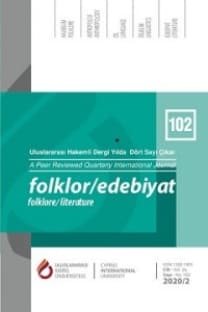Gao Xingjian’ın Ruh Dağında Mit, Folklor ve Sözlü Geleneğin Temsili
Gao Xingjian, yerli ekoeleştiri, kültürel bellek, mitler
Representation of Myth, Folklore and Oral Tradition in Gao Xingjian’s Soul Mountain
Gao Xingjian indigenous ecocriticism, cultural memory, myths, landscape,
___
- Reference 1 Barua, Krishna and Anurag Bhattacharyya. (2016). “Place, Landscape and Self in Gao Xingjian’s Soul Mountain,” in Simon C. Estok, I-Chun Wang and Jonathan White (eds) Landscape, Seascape and the Ecospatial Imagination. Routledge. 197-208.
- Reference 2 Buell, Lawrence. (1995). The Future of Environmental Criticism: Environmental Crisis and Literary Imagination. Blackwell Publishing.
- Reference 3 Carson, Rachel. (1999) Silent Spring. Penguin.
- Reference 4 Glotfelty, Cheryll and Harold Fromm. (1996). The Ecocriticism Reader: Landmarks in Literary Ecology. University of Georgia, 1996.
- Reference 5 Kottak, Conrad P.(1999). “The New Ecological Anthropology”, American Anthropologist New Series, 10:1, 23-35.
- Reference 6 McLaren, Anne E.(1994). “Folk Ecology and Epics in Rural China”, Asian Studies Review 18.1,77-88.
- Reference 7 Moran, Thomas. (2002). “Lost in the Woods: Nature in Soul mountain”. Modern Chinese Literature and Culture, 14.2, 207-36.
- Reference 8 Lee, Mabel. (2007). “Literature and Metaphysics: About Soul Mountain”. The Case for Literature. Yale University Press, 82-103.
- Reference 9 ---. (2007). “The Voice of the Individual”. The Case for Literature. Yale University Press, 126-139.
- Reference 10 Louie, Kam. (2001) “In Search of the Chinese Soul in the Mountains of the South”. The China Journal, No. 45, 145-49.
- Reference 11 Miller, James.( 2003). Daoism: A Short Introduction. Oneworld Publications.
- Reference 12 Monani, Salma and Joni Adamson. (2017). Ecocriticism and Indigenous Studies: Conversations from Earth to Cosmos. Routledge.
- Reference 13 Xingjian, Gao. (2001). Soul Mountain. Trans. Mabel Lee. Harper Perennial.
- Reference 14 Yeung, Jessica. (2008) Ink Dances in Limbo: Gao Xingjian’s Writing as Cultural Translation. Hong Kong University Press.
- Reference 15 Relph, Edward.(1976). Place and Placelessness. Pion Limited.
- Reference 16 Schama, Simon. (1995). Landacape and Memory. Alfred A. Knopf.
- Reference 17 Swearer, Donald K (2009). Ecology and the Environment: Perspectives from the Humanities. Harvard University Press.
- Reference 18 Tam, Kwok-kan (2001). Soul of Chaos: Critical Perspectives on Gao Xingjian. The Chinese University Press.
- Reference 18 Tuan, Yi-Fu. (2001). Space and Place: The Perspective of Experience. University of Minnesota Press.
- Reference 19 Ying, Li-Hua. (2010) Historical Dictionary of Modern Chinese Literature, The Scarecrow Press.
- Reference 20 Zhang, Yinde. (2010) “Gao Xingjian and Forbidden Memory”. China Perspectives, 25-33.
- ISSN: 1300-7491
- Yayın Aralığı: 4
- Başlangıç: 1994
- Yayıncı: -
Hikâye Kahramanlarının Gözünden Sosyolojik Bir Simge: Marşal Katırı Hikâyesinde Traktör
Janset GÜNAYDIN, Tülay UĞUZMAN
Hayvan Halk Masallarında Arjantin Yerli Kültürü
Colorado Nehri Gibi Hissetmek: Restorasyon Çevreci Eleştirisi’nin Temelleri
Kıbrıs Türkçesi ve Türkiye Türkçesinde Sürerlik ve Bitmişlik Değeri Taşıyan Eylem Görünüşleri
Halk Dininin Bir Tanımına Doğru
Çevirmen: Ahmet Tacetdin HALLAÇ
Afganistan Türkmenlerinde Doğum ve Çocukla İlgili Örf, Âdet, İnanç ve Uygulamalar
Anlatı Yerlemleri: Kişi, Süre, Uzam. Tahsin Yücel (1993) İstanbul: Yapı Kredi Yayınları
Gao Xingjian’ın Ruh Dağında Mit, Folklor ve Sözlü Geleneğin Temsili
Çok Anlamlılıktan Eş Adlılığa Doğru Tarihsel Bir Yolculuk
Asmaları Ağlatan Kadınlar: Menopoz Geçiş Döneminde Kara Talihin Ritüel Transferi
